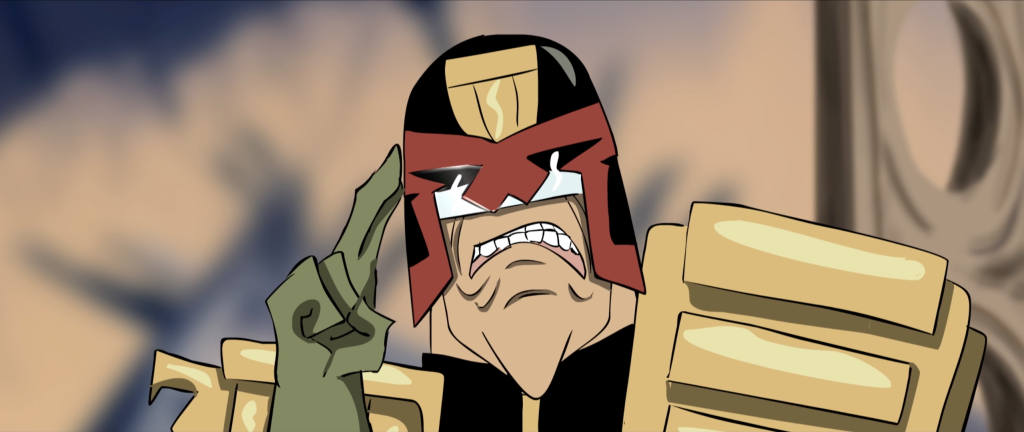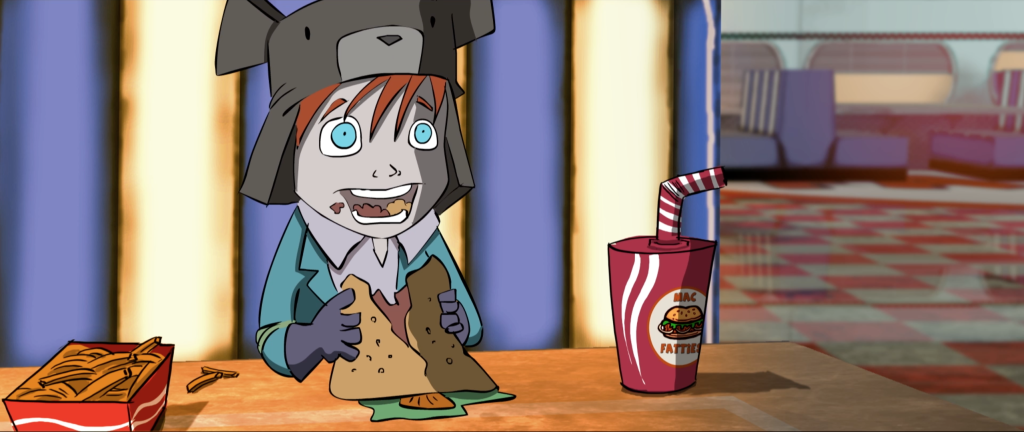At 29, Adi Shankar is one of the hottest young producers in town and one of the few guys who isn’t afraid to produce risky R-rated material. His credits include The Grey, Dredd, Lone Survivor, and A Walk Among The Tombstones. He’s also releasing one of my favorite scripts, The Voices, next year.
Shankar’s counter-culture approach extends to the web as well, where he’s produced the short film, “Punisher: Dirty Laundry,” starring Thomas Jane and Ron Pearlman, and “Venom: Truth in Journalism.” His newest offering is the animated dark comedy mini-series, “Judge Dredd: Superfiend,” which you can go watch right now!
SS: Before we get into writing, I’ve always admired your ability to make these risky R-rated films in an industry that’s typically afraid of that space. How do you pull it off?
AS: Most companies egregiously overspend on overhead. I believe in a lean, tight-knit team, and it allows me to be cost effective in all my decision-making and affords me the financial freedom to make “riskier” films.
SS: Okay, moving on to my bread and butter. I always talk to writers here on Scriptshadow from a writing perspective. But producers see the craft differently. From your side of the wall, what advice can you give writers just starting out?
AS:
1. When starting out, don’t be discouraged by people with the “9 to 5” jobs. They are the ones who urge you to “be realistic,” goad you as you attempt to understand yourself, and bring you down during your sporadic, minor, yet intangible victories. Take solace in the fact that these “9 to 5-ers” will get their minds blown when they see Katy Perry (or equivalent) at a restaurant one day and it will become the single defining moment of their lives, while you are attempting to add to the discourse of the culture.
2. Write every single day. If you don’t, writing will always just be your hobby. (Note: This doesn’t mean quitting your job)
3. You should read 200 “great” professional screenplays before you start writing so that you know what you are aspiring to be. The resources (scripts, interviews, trades, etc.) you have access to today as a beginning screenwriter are unparalleled and were only available to previous generations by becoming someone’s bitch. For the first time, you don’t even need to live in Los Angeles to be a screenwriter or to have your work read.
4. Follow the plethora of online recourses that weren’t available to past generations i.e Blacklist and the tracking boards, to see what’s selling, what’s getting heat and not selling, what’s getting acclaim, and what’s getting acclaim but not selling. This will inform your understanding of the marketplace and the business of screenwriting.
5. Write and produce for the Internet. It blows my mind that more people aren’t attempting to build a web footprint. Check out NEXT TIME ON LONNY it’s simple, smart, funny and is a blueprint for anyone who aspires to create.
SS: What about writers who are closer to the mid-level? These might be writers on the verge of breaking in or who have just punctured the lower levels of the industry. Any advice for them?
AS: The biggest misconception you have to psychologically fight is this idea that once you cross a certain imaginary threshold in your career you’ll feel “made.” You’ll never feel truly “made.” While, like any rote skill, things do get easier over time, you struggle consistently at any level and actually feel more not less pain at every higher rung on the proverbial ladder.
This industry is convoluted and hard for everyone: Whether you’re a novice writer or Robert Towne, a beginning actor or Russell Crowe, an assistant at the mailroom or Stacy Sneider there is always arbitrary red tape, infuriating walls built by insecure middlemen, and some asshole that just wants to fuck you over for the sake of fucking you over. You are constantly living with a damoclean sword over your head and a lottery ticket in your hand, one bad decision away from being black balled and one great sentence away from becoming the next big thing.
SS: Everybody’s trying to get their idea/script/project to the guy who’s able to say “yes” and the movie is greenlit. You’re occasionally that guy. In your best estimation, what do you need from a screenplay to give it that green light? What makes you say “yes?”
AS: Two things need to happen:
1. I need to respond to it creatively. (Note: I detest the routine and respond to material that is unconventional).
2. The market needs to respond to it financially.
As you can imagine 1 & 2 are almost always at odds with one another.
To be specific, by the “market” I don’t mean the movie-going public. Unless you are operating at the highest of levels (aka the Chris Nolan, Spielberg, JJ Abrams level), producers/directors don’t make movies for audiences, we make movies for distributors, and are beholden to what distributors believe audiences want (read: the last successful movie).
Second only to the inability of distributors to match a prospective customer with a specific product in a cost effective manner, the biggest problem that our industry needs to solve is the issue of access. Information is a commodity to the detriment of the business.
So my advice to writers: Figure out what the market wants and write the best version of that as quickly as you can before the market changes. For example, in 2008 it was quirky indie comedies, in 2010 it was $25-30 million dollar action movies, in 2012 it was $3 million dollar horror movies. Pretty soon the $7-12 million range, which for years had been the “no mans land,” is going to be the independent sweet spot.
SS: This leads me to a question I’ve always had. This industry is actor and director driven. If you get a big actor or director attached to your script, the project has a much better chance of getting made. So as a writer, should I be trying to find ways to get actors and directors to read my script so they’ll attach themselves, THEN come to you? Or should I come to you first and let you use your relationships with actors and directors to put that project together?
AS: It depends. I prefer STD free scripts, but sometimes if the attachments are so great then everyone is obviously going to pay more attention. Again, it depends on the producer and the genre of the script.
By and large I’ve found attachments for the sake of attachments to be a detriment. I once read a script that I thought was great but the manager insisted that a much hated director had to be attached to direct. That manager ultimately screwed the writers by making their very makeable, highly marketable script instantly un-makeable due to a bogus attachment. The marketplace moved on and the window of opportunity to make the film passed.
Also, when you’re attaching someone, realize that you are getting in business with the person, that person’s reputation within the industry, and reputation with the potential buyers for your project, not their credits.
SS: You sell your movies to many foreign territories, which is a way to fund your movies (or most of them) before they even get made. Film is becoming more and more of a global business. Should screenwriters be accounting for that in their screenplays? Should we be writing differently? How does one write for a “global audience?”
AS: Don’t worry about this. Just try to tell a really great story. The more you get caught up in trying to retrofit a human story into something that will “sell globally” the more you risk diluting your material.
SS: You were telling me about a project awhile back, an idea you came up with. And you said you went out and found a writer for that. How does a writer (say, a writer reading this right now) become the person you call to write your movie? How does he get in that room with you?
AS:
Step 1: In that particular instance the writer had written the last movie by the director whom I was developing the idea with. The brutal reality is that writers almost always get hired for an assignment because of a working relationship.
Step 2: When I call writer’s representatives, it’s preferable that they be “user friendly.” I’ve passed on working with so many talented writers because I thought their agent or manager was a cheese dick and was going to cause problems down the road.
Best blanket advice I can give to an up-and-coming writer:
Find a talented director at “your level” and partner with them and become “their writer” and start operating as a team (See: Wigard, Adam & Barrett, Simon). So many talented directors are in dire need of writer/producers to execute their wonderful ideas and more importantly for a creative partner who isn’t a cornball producer trying to pull a silver dollar out from behind their ear. This journey in 2014 is now too complicated and frankly impossible to do alone, so build a collective.
To be a douche and quote myself:
“Hollywood is undergoing a massive decentralization right now, caused by the ongoing collapse of the studio system and the rampant greed of the 90’s. It means that collectives of people who can consistently and autonomously deliver a product will have an advantage. They will help you sift through all the crap Hollywood throws at you, and more importantly give you the kind of creative autonomy that today’s non-celebrity filmmakers can only dream of.”
SS: Is it important that a writer be “good in the room” with you? Do you have to feel a chemistry or a certain energy and knowledge from them to work with them? Or do you only care about how good of a writer they are?
AS: Being good in the room doesn’t matter. I don’t want the guy who sells me the car to design and build the car too. I’m also not looking for a friend, girlfriend, roommate, drinking buddy, flip cup or beer pong partner. Humility, writing skills, and general insight about life that can be retrofitted into a screenplay are all that matter. I do meet many writers who are whiney and unloved and complain about “how unfair the industry is” and I generally want to bitch slap them … so don’t be that guy.
SS: I ask a lot of producers what they want from a script, and they almost always say, “I’m just looking for something great.” Is it really that easy? Or are there more factors involved?
AS: It’s that simple. We just want great material. Great material will attract a great director and that package will attract “bankable” (note: as an actor myself that word pisses me off) actors. It will make distributors fight over the distribution rights. Give me SOURCE CODE and I’ll produce and deliver you a finished film via text message faster than you can say Punisher Dirty Laundry.
SS: Does a writer need an agent for you to read their scripts? If you do receive scripts outside of agents, where do they come from?
AS: It’s a legal grey area. I desperately want to discover a great script from under a rock but legal reasons make it challenging.
Traditionally, success in this business has been proportional to one’s access to information. In their inevitable next evolution, online screenplay resources like ScriptShadow, Trigger Street, and Blacklist are very shortly going to revolutionize the way producers/actors/directors access material and democratize the green lighting process.
Before the Internet, an agent had the ability take a script off the shelf and present it as brand new. Tracking boards made the spec market efficient. Blogging made it possible for one to dissect material and allowed the industry to congregate behind risky but great material. The next tectonic shift will be numerically driven and force an egalitarian more “crowd sourced” process to the chaotic status quo.
On the issue of agents, keep in mind that reps are useless unless you have a career spark. To be clear, it’s on you at every juncture in your career to create a spark for yourself. If you are unrepped and looking for your big break right now the web stuff is the best platform to create a spark. What reps are really good at is turning a spark into a flame and the best reps will help convert that flame into a forest fire (see: Jennifer Lawrence and Bradley Cooper).
SS: Finally, we all know Hollywood prefers intellectual property that’s already proven. Since all screenwriters are poor and can’t afford to buy flashy intellectual property, what can they do to compete with these guys?
You bring up an interesting point. In television, the writers are the producers. This should be the case in the movie business as well, as it would eliminate a lot of the infrastructural problems we face.
A trend I’ve noticed is that once writers become deemed “professional writers” many take the mentality of “I need to be paid to write.” While I can sympathize, the fact of the matter is great screenplays are the lifeblood of this industry. If you have a great story that must be told … fucking write it.
It doesn’t make sense to waste time waiting for some jerk off producer or studio to “buy your idea.” Own it, control it, and if you really are that good you may have just written the next DALLAS BUYERS CLUB, PRISONERS, or LOW DWELLER (OUT OF THE FURNACE). Every major movie star and every major director needs a “next movie” and even those we have deemed gods at the moment are beholden to access to great material and are at the mercy of those who control it. Unencumbered scripts are easier to make.




